中国节日介绍英文版本.docx
中国传统节日英文版
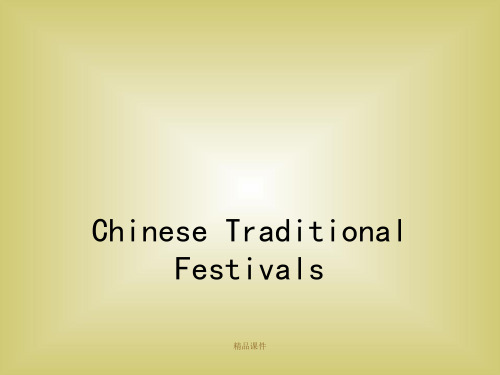
精品课件
Eat yuán xiāo or tāng yuán
精品课件
精品课件
精品课件
The dragon boat Festival
端午节 duān wǔ jié
5th day of the 5th lunar month
精品课件
qīng tuán(S)
zòng zi
Chinese Traditional Festivals
精品课件
Lunar Calendar 农历
nóng lì
精品课件
Chinese Zodiac
精品课件
Spring Festival 春节
chūn jié
Most important Get together
精品课件
Transport during the Spring Festival
精品课件
The Goddess Chang's fly to the moon 嫦娥奔月
Cháng’é bēn yuè
精品课件
Moon Cake 月饼
yuè bǐng
精品课件
Enjoy the glorious full moon with famlies or friends
(Xī’ ān 2016)
精品课件
The Lantern Festival 元宵节
yuán xiāo jié
huā dēng
精品课件
15th day of the 1st lunar month
The carnival of ancient China
精品课件
Customs Guessing lantern riddles
中国传统节日 英文版
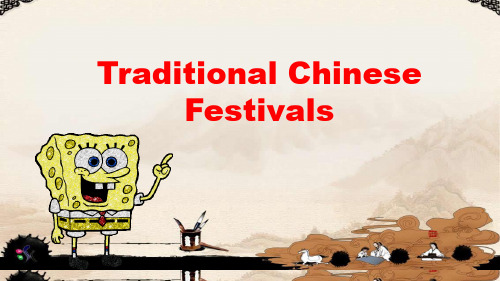
The spring festival 春节 The Lantern Festival 元宵节 Tomb-sweeping Day 清明节 the Dragon Boat Festival 端午节 Double Seventh Day 七夕节 Mid-Autumn Day 中秋节
Double Seventh Day
——Chinese Valentine’s Day
Introduction
• full of romance • It' s on July 7th in the lunar calender each year • The Weaving Girl(织女) and the Cowherd(牛郎 ) in heaven would meet at the Magpie Bridge • Also called Begging-for-Dexterity Festival(乞 巧节)
• Many traditional customs and activities are held on the specified day by people in China and even by some people in neighbouring countries. Among these customs are dragon boat racing, eating zongzi, wearing a perfume pouch(香囊), tying fivecolour silk thread and hanging mugwort leaves(艾叶 ) and calamus(菖蒲).
Mid-Autumn Day 中秋节
中国传统节日介绍英文版
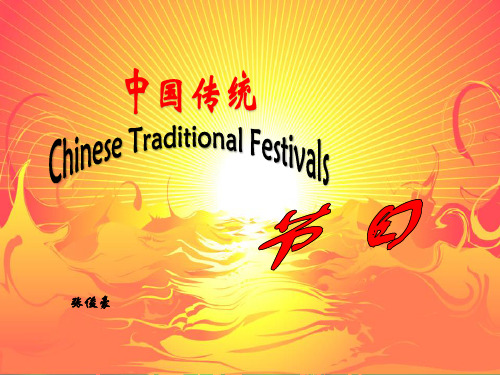
Origin Customs
Origin
Qing Ming is popularly associated with Jie Zi Tui, who lived in Shanxi province in 600 B.C. Legend has it that Jie saved his starving lord's life by serving a piece of his own leg. When the lord succeeded in becoming the ruler of a small principality, he invited his faithful follower to join him. However, Jie declined his invitation, preferring to lead a hermit's life with his mother in the mountains.
中国节日英文介绍

中国节日英文介绍以下是一篇关于中国节日的英文介绍:China is a country with a long history and rich culture, and there are many traditional festivals. These festivals reflect the traditions and values of the Chinese people, and are also an important part of Chinese culture. Here are some of the main Chinese festivals:1. Spring Festival: Spring Festival is the most important traditional festival in China, also known as the Chinese New Year. It usually falls in January or February and lasts for 15 days. During this period, people will clean their homes, paste Spring Festival couplets, set off fireworks, and eat reunion dinners with their families.2. Lantern Festival: The Lantern Festival is held on the 15th day of the first month of the lunar calendar, marking the end of the Spring Festival. On this day, people usually eat yuanxiao (glutinous rice balls), watch lantern shows, and guess lantern riddles.3. Qingming Festival: The Qingming Festival falls on April 4th or 5th of the solar calendar, and it is a traditional festival for ancestorworship and tomb sweeping. People will offer flowers, food, and wine to their ancestors, and clean up the tombs.4. Dragon Boat Festival: The Dragon Boat Festival is held on the fifth day of the fifth month of the lunar calendar, and it is to commemorate the patriotic poet Qu Yuan. On this day, people will eat zongzi (glutinous rice dumplings), watch dragon boat races, and hang mugwort and calamus.5. Mid-Autumn Festival: The Mid-Autumn Festival is held on the 15th day of the eighth month of the lunar calendar, and it is a festival for family reunion. People will eat mooncakes, appreciate the full moon, and tell stories about the moon.These are just some of the Chinese festivals. Each festival has its own unique traditions and cultural connotations, which together constitute the rich and colorful Chinese cultural heritage.。
中国的传统节日英语四篇(优秀)

中国的传统节日英语四篇(优秀)中国的传统节日英语篇一to the chinese people it is as important as christmas to people in the west.spring festival is the most importantand popular festival in spring festival ,the people usually clean and decorate their they go to the flower fairs to buy some flowers.during spring festival ,the adults usually give lucky money to often get together and have a big people eat dumpling for dinner.i love spring festival .中国的传统节日英语篇二hi! tom,i’m glad to hear that you are interested in traditional chinese festivals.my favorite festival is the mid-autumn festival.it usually es in september or october. on that day, our family members usually get together and have anice meal. after that, i always admire the moon and share mooncakes with my families.i love this festival because i like eating mooncakes. they are in the shape of a full moon. they carry people’s wishes to the families they love and miss.in short, the mid-autumn festival is a day of pleasure and happiness. i hope that my letter will help you know more about chinese festivals.yours,li hua中国的传统节日英语篇三when the traditional festival es, everybody is excited about it, because they will have holiday to relax. the meaning of these festivals is remembered by the old generation all the time, while some young people do not know. so when we enjoy the holiday, we need to know more about the traditional culture.大家都会很兴奋得知有传统节日将要降临时,因为他们会有假期来放松自己。
中国节假日英文版
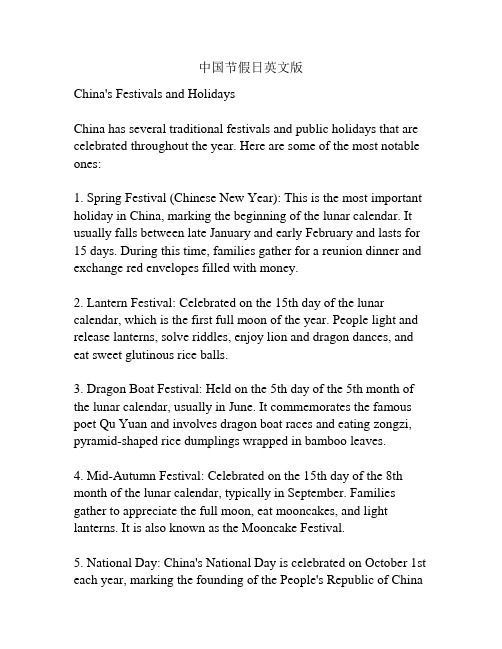
中国节假日英文版China's Festivals and HolidaysChina has several traditional festivals and public holidays that are celebrated throughout the year. Here are some of the most notable ones:1. Spring Festival (Chinese New Year): This is the most important holiday in China, marking the beginning of the lunar calendar. It usually falls between late January and early February and lasts for 15 days. During this time, families gather for a reunion dinner and exchange red envelopes filled with money.2. Lantern Festival: Celebrated on the 15th day of the lunar calendar, which is the first full moon of the year. People light and release lanterns, solve riddles, enjoy lion and dragon dances, and eat sweet glutinous rice balls.3. Dragon Boat Festival: Held on the 5th day of the 5th month of the lunar calendar, usually in June. It commemorates the famous poet Qu Yuan and involves dragon boat races and eating zongzi, pyramid-shaped rice dumplings wrapped in bamboo leaves.4. Mid-Autumn Festival: Celebrated on the 15th day of the 8th month of the lunar calendar, typically in September. Families gather to appreciate the full moon, eat mooncakes, and light lanterns. It is also known as the Mooncake Festival.5. National Day: China's National Day is celebrated on October 1st each year, marking the founding of the People's Republic of Chinain 1949. It is a public holiday, and people often participate in various festivities, including fireworks displays and parades. These festivals and holidays hold significant cultural and historical importance in China and are celebrated with enthusiasm and joy throughout the country.。
Word——中国传统节日英文版

Traditional Festivals in ChinaT raditional festivals are important events in the life of every Chinese, beginning right from childhood. Festivals such as the Chinese New Year, the Dragon Boat Festival, the Mid-Autumn Festival, and the Winter Solstice are more or less evenly distributed across the four seasons. In China's traditional agricultural society, festivals served to mark the passing of time.L et's take a close look to these festivals:The Lantern FestivalT he Lantern Festival is on the 15th of the first lunar month. That night there is a full moon, and every household is decorated with colorful lanterns and prepares yuanxiao. Yuan Xiao, a kind of round dumpling make of glutinous rice flour sweet or salted fillings, which is boiled or fired. Yuan Xiao, literally "the night of the first full moon", which is another name for the festival. When night falls, people go into the street, where exquisite lanterns of diverse designs are hung. Some are pasted with riddles for the passers-by to solve.I t is said that after the Yuan Dynasty (1206-1368) destroyed the Jin (1115-1234), the band of the Yuan army celebrated the victory with gongs and drums. Since then beating gongs and drums has been a local tradition to express joy and happiness.I n the country and town, people celebrate it heartily. For some reason, there is often a bigger celebration in the rural areas, especially in the North. The most popular food for this festival is yuanxiao. Apart from yuanxiao, the customary foods vary from place to place. In Shanxi Province, people take yuanxiao tea, a sort of soup made of boiled flour mixed with vegetables and fruits; in Luoyang and Lingbao, Henan Province, people favor jujube paste; in Kunming, Yunnan Province, people prefer bean dough. Other folk customs of the Lantern Festival include attending the lantern fair, guessing riddles and performing traditional festivities.Dragon boat festivalVarious perfume bags glutinous rice dumpling (zongzi)The Spring festivalFamily CelebrationO n the last day of the old year, everyone was busy either in preparing food for the next two days, or in going to the barbers and getting tidied up for the New Year’s Day. Tradition stipulated that all food be pre-pared before the New Year’s Day, so that all sharp instruments, such as knives and scissors, could be put away to avoid cutting the "luck" of the New Year. The kitchen and well were not to be disturbed on the first day of the Year. The New Year’s Eve and New Year’s Daycelebrations were strickly family affairs. All members of the family would gather for the impo rtant family meal on the evening of the New year’s Eve. Even if a family member could not attend, an empty seat would be kept to symbolize that person’s presence at the banquet. At midnight following the banquet, the younger members of the family would bow and pay their respects to their parents and elders.Lai-SeeO n New Year’s Day, the children were given Red Lai-See Envelopes , good luck money wrapped in little red envelopes. On New Year’s day, everyone had on new clothes, and would put on his best behavior. It was considered improper to tell a lie, raise one’s voice, use indecent language, or break anything on the first day of the year. Starting from the second day, people began going out to visit friends and relatives, taking with them gifts and Lai-See for the children. Visitors would be greeted with traditional New year delicacies, such as melon seeds, flowers, fruits, tray of togetherness, and NIANGAO, New Year cakes.The moon festivalO n the 15th day of the 8th month of the lunar calendar, there is a Harvest moon. Some countries call it Harvest Festival. Here in China, they call it the Mid-Autumn festival, Chinese culture is deeply imbedded in traditional festivals. Just like Christmas and Thanksgiving in the West, the Moon Festival is one of the most important traditional events for the Chinese.T he Moon Festival is full of legendary stories. Legend says that Chang Er flew to the moon, where she has lived ever since. You might see her dancing on the moon during the Moon Festival.T he Moon Festival is also an occasion for family reunions. When the full moon rises, families get together to watch the full moon, eat moon cakes, and sing moon poems. With the full moon, the legend, the family and the poems, you can't help thinking that this is really a perfect world. That is why the Chinese are so fond of the Moon Festival.A s every Chinese holiday is accompanied by some sort of special food. on the Moon Festival, people eat moon cakes, a kind of cookie with fillings of sugar, fat, sesame, walnut, the yoke of preserved eggs, ham or other material. Some moon cakes are of very high quality and very delicious. An overseas tourist is advised not to miss it if he or she happens to be in China during the Moon Festival.T he Moon Festival is also a romantic one. A perfect night for the festival is if it is a quiet night without a silk of cloud and with a little mild breeze from the sea. Lovers spend such a romantic night together tasting the delicious moon cake with some wine while watching the full moon.T here are also many other traditional festivals in China, such as The Chinese Valentine's day(七夕节—中国情人节),Double Ninth Day (重阳节) and Water Sprinkling Day (傣族泼水节)H ope all the Chinese traditional festivals will bring you happiness.。
中国传统节日英语作文(大全5篇)

中国传统节日英语作文(大全5篇)第一篇:中国传统节日英语作文My Favorite FestivalWhat is the name of the festival?Spring Festival When is it?First day of the Chinese lunar calendar What do people eat?A big dinner niangaojiaozimeat fish What do people do? • Clean the house several days before the festival • Buy new clothes • Have a reunion dinner with the family on the eve • Visit relatives after the festival • Give “lucky” money to children Why do you like it so much? I think I can meet relatives.I know receiving “lucky” money makes me happy.I think that setting off fire crackers is interesting.I wonder if I can do these things next year.用下列句式造句,谈谈对不同节日的看法:I think…He thinks…She thinks… I believe…He thin ks…She thinks… I wonder…He wonders…She wonders…Spring Festival I know that Spring Festival is the most important festival for Chinese people.It comes in January or February.People usually clean their houses before the Spring Festival.People have a big family dinner on the eve of the Spring Festival.Young people bow to old people and wish them a happy new year.Old people give children “lucky money”.The next morning people put on their new clothes, go to see their friendsand relatives and say “Happy New Year” to each other.I think that Spring Festival is one of the most important festivals in China.I love it very much.Middle-Autumn Festival People believe that the Middle-Autumn Festival is one of the most traditional Chinese festivals, it is often celebrated in September or October.During the festival, family members get together and eat moon cakes.There are many kinds of delicious moon cakes.I think they are very delicious.On the evening of the Middle-Autumn Festival, people can enjoy the full moon in the dark sky.I like Mid-Autumn Festival because it makes me happy.Dragon Boat Festival The Dragon Boat Festival is a traditional festival in China.There’s a folk story about this festival.Many years ago, There was a poet called Qu Yuan.He loved his country very much.However, the king asked him to leave the country.He felt very sad.When he learned that another country had seized his country, he didn’t want to live any more.On the fifth day of the fifth lunar month, he jumped into Miluo River.The local people rowed the boat to save him, but it was too late.They didn’t want the fish to eat his body, So they dropped rice balls into the river.Nowadays, on this day, we watch dragon boat races and eat ZONGZI in memory of Qu Yuan.第二篇:中国传统节日英语作文The Dragon Boat Festival, also called the Duanwu Festival, is celebrated on the fifth day of the fifth month according to the Chinese calendar.People always eat rice dumplings and watch dragon boat races to celebrate it.The festival is best known for its dragon-boat races, especially in the southern places where there are many rivers and lakes.It’s very popular.The rice dumpling is made of glutinous rice, meat and so on.You can eat different kinds of rice dumplings.They are very delicious.And Dragon Boat Festival is for Qu Yuan.He is an honest minister whois said to have committed suicide by drowning himself in a river.Overall, the Dragon Boat Festival is very interesting!the Middle-Autumn Festival The Middle-Autumn Festival is one of the traditional Chinese festivals, it is often held in September or October.During the festival, family members get united and have moon cakes together.There are various kinds of moon cakes, such as bean paste, egg-yolk or meat.The shape of a moon cake is round as it symbolizes a big moon.Moreover, in the evening of the Middle-Autumn Festival, people get together in a vacant place, eating delicious moon cakes while appreciating the beautiful moon hanging in the dark sky.To conclude, the Middle-Autumn Festival is a very nice festival for Chinese st Qing Ming Festival, I return home to worship my grandfather.Qing Ming Festival is a folk Festival.In the past, In the past, the Qing Ming Festival was called “Arbor Day”.But Today, Chinese visit their family graves to tend to any underbrush that has grown.Weeds are pulled, and dirt swept away, and the family will set out offerings of food and spirit money.Unlike the sacrifices at a family's home altar, the offerings at the tomb usually consist of dry, bland food.One theory is that since any number of ghosts roomed around a grave area, the less appealing food will be consumed by the ancestors, and not be plundered by strangers.With the passing of time, this celebration of life became a day to the honor past ancestors.Following folk religion, the Chinese believed that the spirits of deceased ancestors looked after the family.Sacrifices of food and spirit money could keep them happy, and the family would prosper through good harvests and more children.Chinese Spring Festival celebrating the end of winter and the warmth of spring.It began in the last day of the lunar year, ends in the 15th day of lunar NewYear, and also is the Lantern Festival.During the Spring Festival, people use red lantern and Spring Festival couplets decorate a house, put on all kinds of colored clothes, often visit friendsand relatives or together eat dumplings, fish, meat and other delicious food.The children are looking forward to receiving red envelope money, and together they play each other the fireworks, with happy.Street with dragonand lion dance and some other carnival activities,CCTV will held the grand Spring Festival ntern Festival is a China’s traditional festival.It is celebrated on the fifteenth day of the first month of the lunar ntern Festival is one of the biggest holidays in China.Several days before Lantern Festival, people begin to make nterns are made in the shape of different animals, vegetables, fruits and many, other things.While making lanterns people usually write riddles on lanterns.On the eve of Lantern Festival, all the lanterns are hung up.On Lantern Festival people go outside to have a look at the lanterns and guess the riddles on the lanterns.Perhaps you call see some wonderful folk performances, Dragon Dance and New Younger.Everything is very interesting and everyone is very happy.Our life is rich and varied.生活就像海洋,只有意志坚定的人才能到达彼岸。
中国节日介绍英文版本.docx
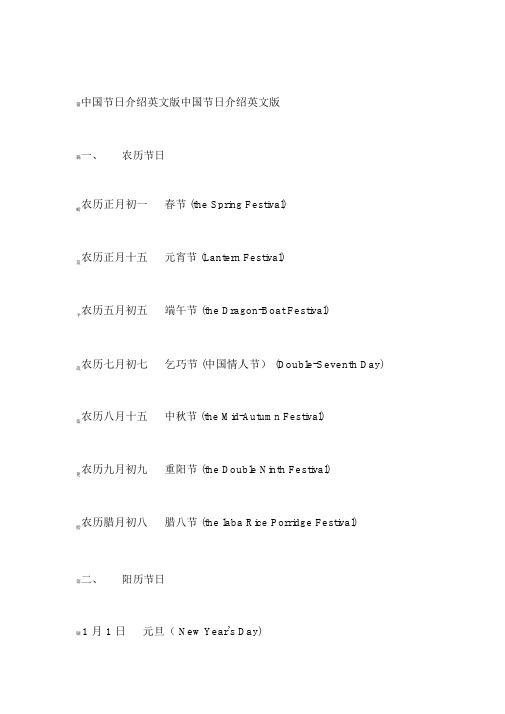
羀中国节日介绍英文版中国节日介绍英文版羈一、农历节日农历正月初一春节 (the Spring Festival)螃农历正月十五元宵节 (Lantern Festival)莁农历五月初五端午节 (the Dragon-Boat Festival)肀农历七月初七乞巧节 (中国情人节) (Double-Seventh Day)荿农历八月十五中秋节 (the Mid-Autumn Festival)蒅农历九月初九重阳节 (the Double Ninth Festival)莄农历腊月初八腊八节 (the laba Rice Porridge Festival)膀蒆二、阳历节日膆1 月 1 日元旦( New Year's Day)膃2 月 2 日世界湿地日 (World Wetlands Day)芀2 月 14 日情人节 (Valentine's Day)3 月 3 日全国爱耳日袆蚄3 月 5 日青年志愿者服务日羁3 月 8 日国际妇女节 (International Women' Day)莀3 月 9 日保护母亲河日芇3 月 12 日中国植树节 (China Arbor Day)莆3 月 14 日白色情人节 (White Day)蚀3 月 14 日国际警察日 (International Policemen' Day)蒀3 月 15 日世界消费者权益日 (World Consumer Right Day)蚈 3 月 21 日世界森林日(World Forest Day)袄3 月 21 日世界睡眠日 (World Sleep Day)螃3 月 22 日世界水日 (World Water Day)蕿3 月 23 日世界气象日 (World Meteorological Day)袅3 月 24 日世界防治结核病日 (World Tuberculosis Day)薆4 月 1 日愚人节 (April Fools' Day)蒂4 月 5 日清明节( Tomb-sweeping Day)蕿4 月 7 日世界卫生日 (World Health Day)芆4 月 22 日世界地球日 (World Earth Day)羄4 月 26 日世界知识产权日 (World Intellectual Property Day)芁5 月 1 日国际劳动节 (International Labour Day)虿 5 月 3 日世界哮喘日(World Asthma Day)蚇5 月 4 日中国青年节( Chinese Youth Day)蚆5 月 8 日世界红十字日 (World Red-Cross Day)芄5 月 12 日国际护士节 (International Nurse Day)蝿5 月 15 日国际家庭日 (International Family Day)肈5 月 17 日世界电信日 (World Telecommunications Day)膄5 月 20 日全国学生营养日肃5 月 23 日国际牛奶日 (International Milk Day)衿5 月 31 日世界无烟日 (World No-Smoking Day)葿6 月 1 日国际儿童节 (International Children's Day)袅6 月 5 日世界环境日 (International Environment Day)6 月 6 日全国爱眼日袁罿 6 月17 日世界防治荒漠化和干旱日(World Day to combat desertification)薅6 月 23 日国际奥林匹克日 (International Olympic Day)莃 6 月 25 日全国土地日薀6 月 26 日国际禁毒日 (International Day Against Drug Abuse and Illicit Trafficking)聿7 月 1 日中国共产党诞生日 (Anniversary of the Founding of the Chinese Communist Party)羆7 月 1 日国际建筑日( International Architecture Day)肅7 月 7 日中国人民抗日战争纪念日蚃7 月 11 日世界人口日 (World Population Day)腿 8 月 1 日中国人民解放军建军节(Army Day)莇8 月 12 日国际青年节 (International Youth Day)蒃9 月 8 日国际扫盲日 (International Anti-illiteracy Day)蒂9 月 10 日中国教师节 (Teacher's Day)膈9 月 16 日中国脑健康日螈9 月 16 日国际臭氧层保护日 (International Day for the Preservation of the Ozone Layer)9 月 20 日全国爱牙日芅膁9 月 21 日世界停火日 (World Cease-fire Day)芈9 月 27 日世界旅游日 (World Tourism Day)腿10 月 1 日中华人民共和国国庆节 (National Day)蚃10 月 1 日国际音乐日 (International Music Day)芄 10 月 1 日国际老年人日(International Day of Older Persons)For personal use only in study and research; not for commercial use。
中国传统节日(中英文对照)
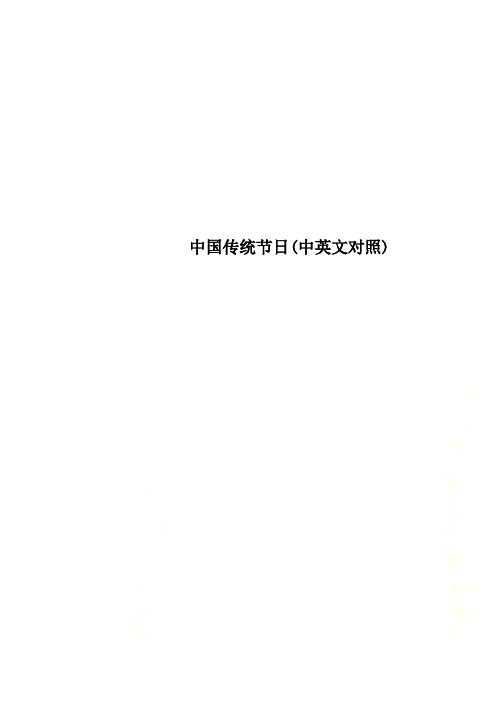
中国传统节日(中英文对照)中国传统节日(中英文对照简介)目录The Spring Festival(春节)Lantern Festival(元宵节)Qingming Festival(清明节)Dragon Boat Festival(端午节)Double Seventh Festival(七夕)Mid-Autumn Festival(中秋节)Double Ninth Festival(重阳节)Winter Solstice Festival(冬至)together to have dinner while watching TV programs.For Chinese at home and abroad, the Spring Festival is always the most important festival.农历的正(zheng)月初一,是中国的农历新年。
在中国的传统节日中,这是一个最重要、最热闹的节日。
因为过农历新年的时候,正是冬末春初,所以人们也把这个节日叫“春节”。
中国人过春节有很多传统习俗。
从腊月二十三起,人们就开始准备过年了。
在这段时间里,家家户户要大扫除,买年货,贴窗花,挂年画,写春联,蒸年糕,做好各种食品,准备辞旧迎新。
春节的前夜叫“除夕”。
除夕之夜,是家人团聚的时候。
一家人围坐在一起,吃一顿丰盛的年夜饭,说说笑笑,直到天亮,这叫守岁。
除夕零点的钟声一响,人们还要吃饺子。
古时候叫零点为“子时”,除夕的子时正是新旧年交替的时候,人们在这时吃饺子,是取“更岁交子”的意思。
这也是“饺子”名称的由来。
过了除夕就是大年初一。
从初一开始,人们要走亲戚、看朋友,互相拜年。
拜年,是春节的重要习俗。
拜年时,大家都要说一些祝愿幸福、健康的吉祥话。
放爆竹是春节期间孩子们最喜欢的活动。
传说燃放爆竹可以驱妖除魔,所以每年从除夕之夜起,到处就响起了接连不断的爆竹声。
阵阵烟花,声声爆竹,给节日增添了喜庆的气氛。
中国节日(英文版)

2 Mid –autumn festival
The custom Of
Mid – Autumn festival
This night ,people look up the circle and bright moon, will naturally look forward to family reunion , therefore the Mid-autumn festival also known as “reunion”
端午节 14
2012-9-18
.The Culture of Rice Dumplings An essential food of the Dragon Boat Festival. Now the fillings are more diversified, including jujube and fresh meat, and ham and egg yolk.
the story of QuYuan
Qu was a minister of the State of Chu during the Warring States Period. He was highly esteemed for his wise advice that brought peace and prosperity to the state. However, when a dishonest and corrupt prince vilified(诽谤) Qu, he was disgraced(贬谪).Then Qu leapt into the Miluo River on the fifth day of the fifth month. The people of Chu who mourned the death of Qu threw rice into the river to feed his ghost every year this day.
英语版中国传统节日
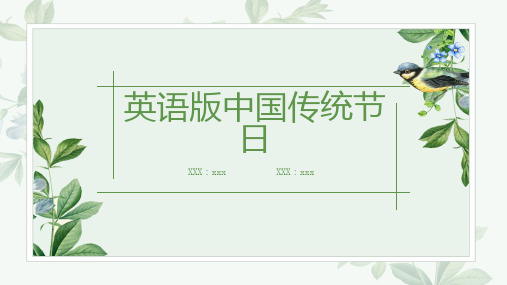
Part 4
Double Ninth Festival
4 Double Ninth Festival
The Double Ninth Festival, also known as Chongyang Festival, is celebrated on the ninth day of the ninth lunar month. It is a festival of respect for the elderly, with people visiting their elderly relatives and climbing high mountains to enjoy the beautiful scenery and health benefits
Part 5
Chinese Valentine's Day
5 Chinese Valentine's Day
Chinese Valentine's Day, also known as Qixi Festival, is celebrated on the seventh day of the seventh lunar month. It is a festival of love and matrimony, with people showing their love for each other by giving gifts, sending flowers, and getting engaged
1 Spring Festival
The Spring Festival, also known as Chinese New Year, is the most important 节日of the year in China. It begins on the first day of the Chinese lunar new year and lasts for 15 days, ending with the Lantern Festival. During this festival, families gather together to celebrate, clean their houses, and prepare for the coming year
介绍中国节日的英语作文模板
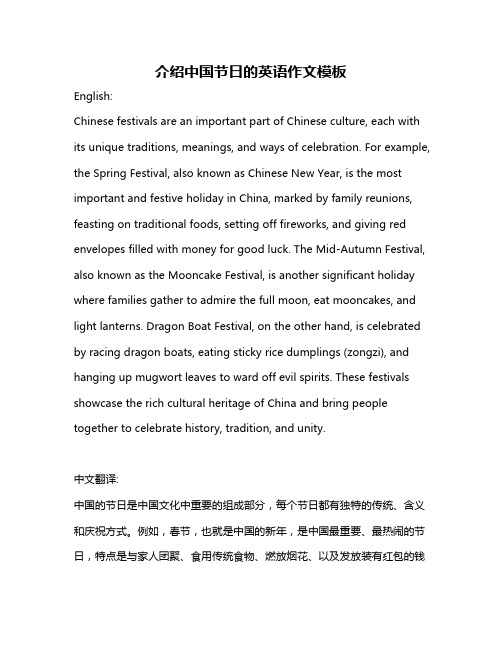
介绍中国节日的英语作文模板English:Chinese festivals are an important part of Chinese culture, each with its unique traditions, meanings, and ways of celebration. For example, the Spring Festival, also known as Chinese New Year, is the most important and festive holiday in China, marked by family reunions, feasting on traditional foods, setting off fireworks, and giving red envelopes filled with money for good luck. The Mid-Autumn Festival, also known as the Mooncake Festival, is another significant holiday where families gather to admire the full moon, eat mooncakes, and light lanterns. Dragon Boat Festival, on the other hand, is celebrated by racing dragon boats, eating sticky rice dumplings (zongzi), and hanging up mugwort leaves to ward off evil spirits. These festivals showcase the rich cultural heritage of China and bring people together to celebrate history, tradition, and unity.中文翻译:中国的节日是中国文化中重要的组成部分,每个节日都有独特的传统、含义和庆祝方式。
中国传统节日英文版
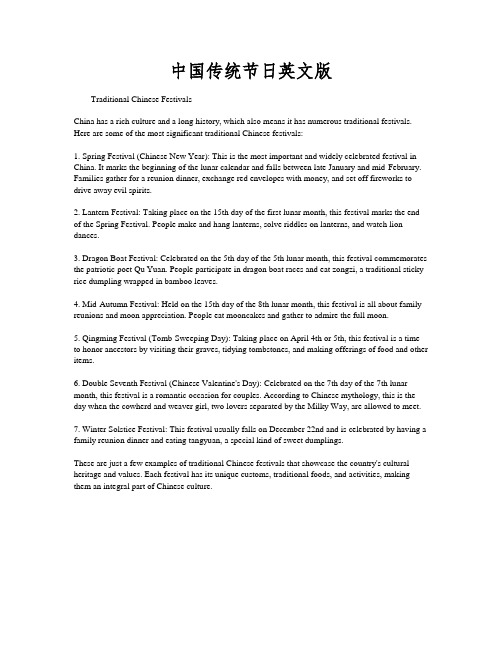
中国传统节日英文版Traditional Chinese FestivalsChina has a rich culture and a long history, which also means it has numerous traditional festivals. Here are some of the most significant traditional Chinese festivals:1. Spring Festival (Chinese New Year): This is the most important and widely celebrated festival in China. It marks the beginning of the lunar calendar and falls between late January and mid-February. Families gather for a reunion dinner, exchange red envelopes with money, and set off fireworks to drive away evil spirits.2. Lantern Festival: Taking place on the 15th day of the first lunar month, this festival marks the end of the Spring Festival. People make and hang lanterns, solve riddles on lanterns, and watch lion dances.3. Dragon Boat Festival: Celebrated on the 5th day of the 5th lunar month, this festival commemorates the patriotic poet Qu Yuan. People participate in dragon boat races and eat zongzi, a traditional sticky rice dumpling wrapped in bamboo leaves.4. Mid-Autumn Festival: Held on the 15th day of the 8th lunar month, this festival is all about family reunions and moon appreciation. People eat mooncakes and gather to admire the full moon.5. Qingming Festival (Tomb-Sweeping Day): Taking place on April 4th or 5th, this festival is a time to honor ancestors by visiting their graves, tidying tombstones, and making offerings of food and other items.6. Double Seventh Festival (Chinese Valentine's Day): Celebrated on the 7th day of the 7th lunar month, this festival is a romantic occasion for couples. According to Chinese mythology, this is the day when the cowherd and weaver girl, two lovers separated by the Milky Way, are allowed to meet.7. Winter Solstice Festival: This festival usually falls on December 22nd and is celebrated by having a family reunion dinner and eating tangyuan, a special kind of sweet dumplings.These are just a few examples of traditional Chinese festivals that showcase the country's cultural heritage and values. Each festival has its unique customs, traditional foods, and activities, making them an integral part of Chinese culture.。
中国节日英语作文

中国节日英语作文China, a country with a rich tapestry of cultural heritage, celebrates numerous festivals that are steeped in history and tradition. These festivals not only bring the Chinese community together but also provide a glimpse into the country's vibrant culture. Here is an overview of some of the most significant Chinese festivals:1. Spring Festival (Chinese New Year)The Spring Festival, also known as Chinese New Year, is the most important traditional festival in China. It marks the beginning of the lunar new year and is a time for family reunions. The festival is celebrated with various customs such as setting off fireworks, giving red envelopes (hongbao) containing money for good luck, and enjoying a feastfeaturing dishes like dumplings and fish, which symbolize prosperity and abundance.2. Mid-Autumn FestivalThe Mid-Autumn Festival falls on the 15th day of the 8th lunar month, when the moon is at its fullest and brightest.It is a time to appreciate the beauty of the moon and to celebrate with family. Mooncakes, a rich, round pastry filled with sweet or savory ingredients, are the traditional food of this festival. They represent unity and are shared among family members.3. Dragon Boat FestivalCelebrated on the fifth day of the fifth lunar month, the Dragon Boat Festival commemorates the life and death of the famous Chinese scholar Qu Yuan. The festival features dragon boat races, where teams of rowers compete in long, narrow boats adorned with dragon heads and tails. Additionally, zongzi (sticky rice dumplings wrapped in bamboo leaves) are eaten during this time.4. Qingming Festival (Tomb-Sweeping Day)The Qingming Festival is a day of remembrance for ancestors. It is observed in early spring and is a time when families visit the graves of their relatives to clean the tombstones, offer food, and burn incense. This festival is also an opportunity for people to go on spring outings and enjoy the fresh air and blooming flowers.5. Lantern FestivalThe Lantern Festival marks the end of the Chinese New Year celebrations and falls on the 15th day of the first lunar month. It is characterized by the display of colorful lanterns and the solving of riddles that are attached to the lanterns. People also enjoy eating tangyuan, sweet rice balls that symbolize family unity and prosperity.Each of these festivals is a unique window into the Chinese way of life, reflecting the country's deep-rooted traditions and beliefs. They are not just days of celebration but also serve as a means to strengthen family bonds and pass down cultural practices to future generations.。
中国传统节日英文版

(Double Fifth Festival)
qiangfu kong
The Dragon Boat Festival,the 5th day of the 5th month in the Chinese lunar calendar,has had a history of more than 2,000 years.it is usually in June in the solar calendar
Customs
2.Realgar ular practice to drink this kind of Chinese liquor seasoned with realgar at the Dragon Boat Festival. This is for protection from evil and disease for the rest of the year. In one word, all of the activities are to protect themselves from evil and honor the poet Qu Yuan
Today, Dragon Boat Festival in the Chinese people is still a very popular grand festival. Country attaches great importance to the protection of intangible cultural heritage, May 20, 2006, the State Council approved the inclusion of the folk first batch of national intangible cultural heritage
中国节日英文介绍
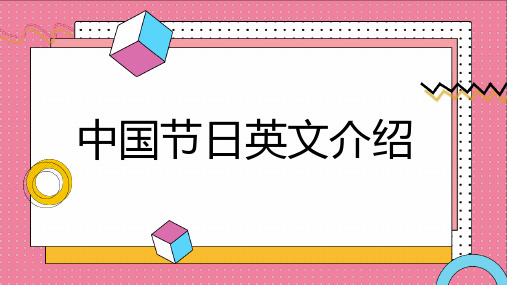
Traditions
It's customary to give red
envelopes (hongbao) and
greet each other with "Happy
Chinese New Year." Other
traditions include cleaning
the house to sweep away bad
The dragon is a symbol of power and good luck in Chinese culture. The dance is believed to ward off evil spirits and bring prosperity
Your Company
Your
Your
luck and decorating with red
paper cutouts for good luck
Your Company
Your Compan
PART 2
Dragon Dance
Dragon Dance
Date Usually during the Spring Festival
Significance
中国节日英文介绍
-
目录
CONTENTS
01 Chinese New Year (Spring Festival)
02
Dragon Dance
Your
Your
Company
Company
Your Company
Your Company
Your Compan
中国节日英文介绍
China, with its rich cultural heritage, has a myriad of festivals that are celebrated with pomp and fervor. These festivals are an integral part of Chinese culture and are marked by vibrant traditions, colorful celebrations, and delicious foods. Let's explore some of the most popular Chinese festivals
中国节日介绍英文版本
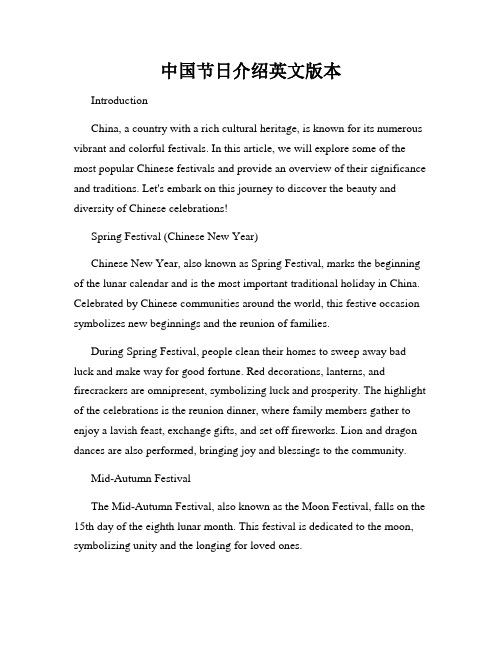
中国节日介绍英文版本IntroductionChina, a country with a rich cultural heritage, is known for its numerous vibrant and colorful festivals. In this article, we will explore some of the most popular Chinese festivals and provide an overview of their significance and traditions. Let's embark on this journey to discover the beauty and diversity of Chinese celebrations!Spring Festival (Chinese New Year)Chinese New Year, also known as Spring Festival, marks the beginning of the lunar calendar and is the most important traditional holiday in China. Celebrated by Chinese communities around the world, this festive occasion symbolizes new beginnings and the reunion of families.During Spring Festival, people clean their homes to sweep away bad luck and make way for good fortune. Red decorations, lanterns, and firecrackers are omnipresent, symbolizing luck and prosperity. The highlight of the celebrations is the reunion dinner, where family members gather to enjoy a lavish feast, exchange gifts, and set off fireworks. Lion and dragon dances are also performed, bringing joy and blessings to the community.Mid-Autumn FestivalThe Mid-Autumn Festival, also known as the Moon Festival, falls on the 15th day of the eighth lunar month. This festival is dedicated to the moon, symbolizing unity and the longing for loved ones.One of the most well-known traditions during the Mid-Autumn Festival is the consumption of mooncakes. These round pastries are filled with various fillings such as lotus seed paste, red bean paste, or salted egg yolks. It is a time when families gather to appreciate the full moon, enjoy mooncakes, and share stories.Dragon Boat FestivalThe Dragon Boat Festival, known as Duanwu, commemorates the death of Qu Yuan, a revered poet of ancient China. Celebrated on the 5th day of the fifth lunar month, this festival is characterized by dragon boat races, zongzi (sticky rice dumplings) making, and hanging up pouches of herbs.During the dragon boat races, teams paddle in sync to the rhythm of beating drums, while spectators cheer them on. It is believed that the energetic dragon boat races and the rowdy drum beats help to ward off evil spirits and diseases. Eating zongzi is another important tradition during this festival, as it is said to honor the rice offerings made to Qu Yuan to prevent fish from eating his body.Lantern FestivalThe Lantern Festival signifies the end of the Chinese New Year celebrations. Occurring on the 15th day of the first lunar month, this festival is highlighted by vibrant lantern displays, lantern riddles, and lion dances.Throughout the Lantern Festival, streets and parks are beautifully adorned with colorful lanterns of various shapes and sizes, creating a magical atmosphere. Families gather to appreciate the lantern displays, guess riddles written on lanterns, and enjoy performances such as dragon and liondances. The Lantern Festival is a time of wonder and joy as people celebrate the return of spring and the hope for a prosperous year ahead.ConclusionChinese festivals, deeply rooted in tradition and culture, offer a delightful blend of rituals, customs, and festivities. Whether it is the exuberance of the Spring Festival, the moonlit reunions of the Mid-Autumn Festival, the excitement of dragon boat races during Duanwu, or the enchanting lantern displays of the Lantern Festival, each celebration holds a special place in Chinese hearts.These festivals not only bring families and communities together but also serve as a reminder of China's rich history and cultural diversity. As the world becomes more interconnected, it is important to appreciate and preserve these centuries-old traditions, allowing the beauty of Chinese festivals to transcend borders and enrich the lives of people from all walks of life.。
中国节日英文大全

中国节日英文大全China has a rich and diverse cultural heritage, which is reflected in its many traditional festivals. These festivals are an important part of Chinese culture and are celebrated with great enthusiasm and joy. In this document, we will introduce you to a comprehensive list of Chinese festivals in English, providing a brief overview of each festival and its significance.1. Spring Festival (春节)。
The Spring Festival, also known as Chinese New Year, is the most important and widely celebrated festival in China. It marks the beginning of the lunar new year and is a time for family reunions, feasting, and the exchange of gifts. Traditional customs include setting off fireworks, giving red envelopes (hongbao) filled with money, and enjoying special foods such as dumplings and fish.2. Lantern Festival (元宵节)。
- 1、下载文档前请自行甄别文档内容的完整性,平台不提供额外的编辑、内容补充、找答案等附加服务。
- 2、"仅部分预览"的文档,不可在线预览部分如存在完整性等问题,可反馈申请退款(可完整预览的文档不适用该条件!)。
- 3、如文档侵犯您的权益,请联系客服反馈,我们会尽快为您处理(人工客服工作时间:9:00-18:30)。
羀中国节日介绍英文版中国节日介绍英文版
羈一、农历节日
农历正月初一春节 (the Spring Festival)
螃
农历正月十五元宵节 (Lantern Festival)
莁
农历五月初五端午节 (the Dragon-Boat Festival)
肀
农历七月初七乞巧节 (中国情人节) (Double-Seventh Day)荿
农历八月十五中秋节 (the Mid-Autumn Festival)
蒅
农历九月初九重阳节 (the Double Ninth Festival)
莄
农历腊月初八腊八节 (the laba Rice Porridge Festival)
膀
蒆二、阳历节日
膆1 月 1 日元旦( New Year's Day)
膃2 月 2 日世界湿地日 (World Wetlands Day)
芀2 月 14 日情人节 (Valentine's Day)
3 月 3 日全国爱耳日
袆
蚄3 月 5 日青年志愿者服务日
羁3 月 8 日国际妇女节 (International Women' Day)
莀3 月 9 日保护母亲河日
芇3 月 12 日中国植树节 (China Arbor Day)
莆3 月 14 日白色情人节 (White Day)
蚀3 月 14 日国际警察日 (International Policemen' Day)
蒀3 月 15 日世界消费者权益日 (World Consumer Right Day)蚈 3 月 21 日世界森林日(World Forest Day)
袄3 月 21 日世界睡眠日 (World Sleep Day)
螃3 月 22 日世界水日 (World Water Day)
蕿3 月 23 日世界气象日 (World Meteorological Day)
袅3 月 24 日世界防治结核病日 (World Tuberculosis Day)
薆4 月 1 日愚人节 (April Fools' Day)
蒂4 月 5 日清明节( Tomb-sweeping Day)
蕿4 月 7 日世界卫生日 (World Health Day)
芆4 月 22 日世界地球日 (World Earth Day)
羄4 月 26 日世界知识产权日 (World Intellectual Property Day)芁5 月 1 日国际劳动节 (International Labour Day)
虿 5 月 3 日世界哮喘日(World Asthma Day)
蚇5 月 4 日中国青年节( Chinese Youth Day)
蚆5 月 8 日世界红十字日 (World Red-Cross Day)
芄5 月 12 日国际护士节 (International Nurse Day)
蝿5 月 15 日国际家庭日 (International Family Day)
肈5 月 17 日世界电信日 (World Telecommunications Day)膄5 月 20 日全国学生营养日
肃5 月 23 日国际牛奶日 (International Milk Day)
衿5 月 31 日世界无烟日 (World No-Smoking Day)
葿6 月 1 日国际儿童节 (International Children's Day)
袅6 月 5 日世界环境日 (International Environment Day)
6 月 6 日全国爱眼日
袁
罿 6 月17 日世界防治荒漠化和干旱日(World Day to combat desertification)
薅6 月 23 日国际奥林匹克日 (International Olympic Day)
莃 6 月 25 日全国土地日
薀6 月 26 日国际禁毒日 (International Day Against Drug Abuse and Illicit Trafficking)
聿7 月 1 日中国共产党诞生日 (Anniversary of the Founding of the Chinese Communist Party)
羆7 月 1 日国际建筑日( International Architecture Day)
肅7 月 7 日中国人民抗日战争纪念日
蚃7 月 11 日世界人口日 (World Population Day)
腿 8 月 1 日中国人民解放军建军节(Army Day)
莇8 月 12 日国际青年节 (International Youth Day)
蒃9 月 8 日国际扫盲日 (International Anti-illiteracy Day)
蒂9 月 10 日中国教师节 (Teacher's Day)
膈9 月 16 日中国脑健康日
螈9 月 16 日国际臭氧层保护日 (International Day for the Preservation of the Ozone Layer)
9 月 20 日全国爱牙日
芅
膁9 月 21 日世界停火日 (World Cease-fire Day)
芈9 月 27 日世界旅游日 (World Tourism Day)
腿10 月 1 日中华人民共和国国庆节 (National Day)
蚃10 月 1 日国际音乐日 (International Music Day)
芄 10 月 1 日国际老年人日(International Day of Older Persons)
For personal use only in study and research; not for commercial use。
